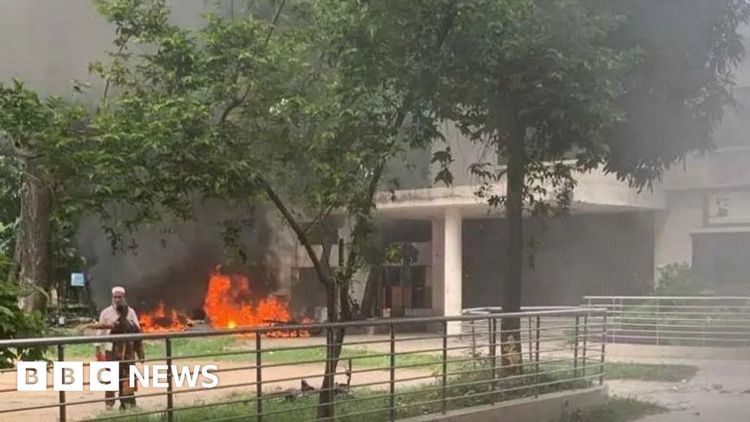Bangladesh protests: Students set state broadcaster alight

Bangladesh is on high alert as students and police clash violently, prompting a security alert for the entire country.
The main city of Dhaka is currently experiencing a nearly complete loss of internet access, and phone services are also unavailable.
Last Thursday night, a large group of demonstrators forcefully entered the state broadcaster BTV, causing extensive damage by destroying furniture, breaking windows and lights, and starting fires in some areas of the building.
The information minister of Bangladesh informed the BBC that broadcasts were halted and the majority of staff had evacuated the premises in the city center.
A recent update on BTV's official Facebook page alerted that numerous individuals were stuck inside the building and requested assistance from the fire department to extinguish the fire.
An experienced BTV reporter, who wished to remain anonymous, shared with the BBC: "The circumstances were extremely dire, and we had no choice but to evacuate. Some of our team members were unable to leave. I am uncertain about their well-being."
The country's leader, Prime Minister Sheikh Hasina, made an appearance on television on Wednesday evening, urging for peace following several days of intense demonstrations that have resulted in the deaths of at least 19 individuals, with potentially even higher casualties, and numerous injuries.
Students have been staging protests, calling for reforms to a policy that sets aside one-third of public sector positions for the family members of veterans of the nation's liberation war against Pakistan in 1971.
The students are disagreeing that the system is unfair, requesting recruitment be based on ability.
The authorities have been attempting to suppress the demonstrations, on Thursday turning off the national mobile internet service in an effort to deter the protesters.
However, it turned out to be the most fatal day yet, as reported by news outlet AFP. Based on their information from hospitals, a total of 32 individuals lost their lives amidst the protests.
The Bengali section of the BBC has reported that 19 people have died, with 13 of those deaths occurring on Thursday. Sadly, one of those who lost their lives was a 32-year-old reporter for the Dhaka Times.
Sheikh Hasina spoke out against the killings of protesters during her TV appearance on Wednesday, calling it "murder." However, protest leaders did not take her words seriously and refused to engage in discussions with the government.
Nahid Iqbal, a prominent figure in the anti-quota protest, stated that the government's actions have resulted in a high number of casualties, making it difficult to engage in any discussions at this time.
A different student, Aleem Khan, age 22, spoke to the BBC and said: "The Prime Minister is urging for the violence to stop on one side, but on the other side, students are being targeted by pro-government groups and police force."
On Thursday, police used tear gas and rubber bullets when students formed human barriers in the streets.
The students who forcefully entered BTV had previously set fire to a police station, as confirmed by a network official.
The official informed AFP that the protesters pursued the police officers as they sought shelter at the BTV office. Subsequently, the enraged demonstrators caused chaos in the area.
In another location, BBC Bengali interviewed a group of medical students seeking refuge within a medical college campus following an assault by supporters of the ruling party.
A student named Sumi expressed to the BBC, "I’m at this protest to speak out against unfair treatment in the civil service. I’m also standing up against the police violence that has resulted in the deaths of many students."
Our demonstration was nonviolent, however, the manner in which we were assaulted left me fearing for our safety, as if we were at risk of being murdered by supporters of the ruling party.

































































